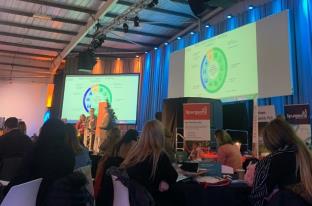Using data for good - there's no going back
December 2019 | News
“Between the dawn of civilization and 2003, we only created five exabytes; now we're creating that amount every two days." Hal Varian, Chief Economist at Google.
The era of staggeringly huge data growth is here and whilst it all may appear overwhelming, it presents a golden opportunity to shape lives for the better, says Sentinel Partners director, Graham McCusker.
This isn’t just about enriching household buying or viewing habits, it’s about using data to detect real issues in society and be proactive in providing solutions.
Local authorities are now on the cusp of a revolution that should see them embrace the possibilities presented by technology and Machine Learning to help citizens of all ages.
The era of the spreadsheet is over
Hal Varian’s quote shows the futility of fully-manual data processing – a practice still pursued by some local authority teams who are swimming against the tide and struggling to put their own limited resources to effective use.
Many are simply failing to use or make sense of the data at their disposal. This could be held by different teams, for example education and children’s services, or by external partners such as police and health authorities
Not only is the manual approach slow, it’s also inefficient compared to an automated data management solution, essentially software that’s capable of integrating and crunching dozens of data streams in seconds and that makes secure and compliant data sharing a reality.
Targeting resources more effectively
The breadth and accuracy of the information delivered by Sentinel’s Data Hub solution provides teams with a fully joined-up view and enhanced insights into individuals and families, enabling them to respond faster and target resources where they are needed most.
This is already happening in forward-thinking councils across the UK, with the Core Cities of Liverpool and Birmingham among the areas where Sentinel's technology is having a positive impact on supporting families and identifying the most vulnerable people in our society.
Taking Liverpool City Council as an example, our Think Family Data Hub has provided the council with an improved understanding of families across the city and the services they require.
Going live, the system immediately produced positive results by identifying 193% more families with complex needs.
Improving and saving lives
It’s important to stress that the machine isn’t making the decisions, it’s simply being set by front-line teams to put superior information at their fingertips.
The technology can also make true multi-agency working a reality, enabling authorities to meet their obligations to share data and help avoid the high-profile tragedies of the past.
A number of serious case reviews, including that of four-year-old Daniel Pelka, have highlighted the consequences which can result when information is not appropriately shared with others.
Further safeguards can now be provided through automated alerts which can quickly draw practitioners’ attention to areas of risk and potentially save lives.
Looking to the future
Not only does today’s technology offer the flexibility, functionality and capacity to meet organisations’ evolving data requirements, it can also help them to predict likely future outcomes.
Some of the most progressive local authorities are already using predictive profiling techniques to identify and analyse complex data patterns that provide insights into citizens’ likely needs in the years to come.
Augmenting professional judgement, this has the potential to support even earlier targeting of resources and provide early help that’s more cost effective than higher level intervention.
We’re at a stage when the data revolution needs to gather speed. Humans cannot do it on their own; let’s enable technology to give them the help they need and see society reap the benefits.



